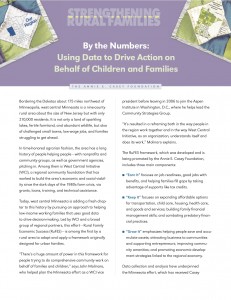Selection of Publications written or edited by Betsy Rubiner
The Aspen Institute Community Strategies Group
2020 – Wrote stories on innovative rural Wisconsin economic development efforts during the coronavirus pandemic featured in “Rural Voices for Prosperity: A Report of the Governor’s Blue Ribbon Commission on Rural Prosperity.” Topic: affordable housing, child care, broadband, arts, manufacturing, education and tribal initiatives. The report can be found here.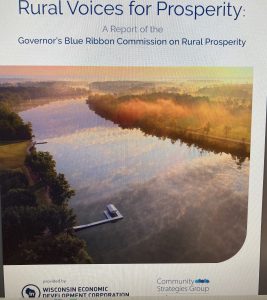
2019 – Editing/wordsmithing of research paper Rural Development Hubs: Strengthening America’s Rural Innovation Infrastructure.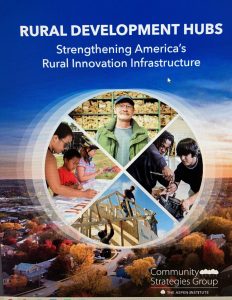
Wrote information briefs on efforts to advance rural immigrant families’ economic success, 2017.
Promising work in rural communities is helping low-income immigrant families Earn it, Keep it, and Grow it: earn more, keep more of what they earn, and grow that into assets over time, in keeping with the Rural Family Economic Success (RuFES) framework:
- COLORADO Parent Mentors and Mobile Preschools: Helping Two Generations in Rural Immigrant Families
- OREGON Stoking the Entrepreneurial Urge: Helping Immigrants Take Steps to Business Success
- CALIFORNIA Driving Change: Getting Immigrant Families in Reliable, Efficient Cars
- CALIFORNIA The Citizenship Difference: Making It One Napa Valley
Annie E. Casey Foundation – wrote Results-Based Leadership Series: Case studies and profiles illustrating programs that help community leaders and public agency staff collaborate effectively on a specific result to benefit vulnerable children and families, including: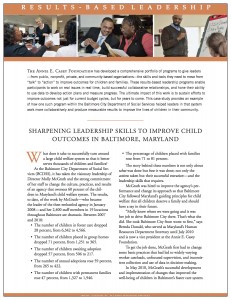
Sharpening Leadership Skills to Improve Child Outcomes in Baltimore. This 2011 case study describes how a results-based leadership program within the Baltimore City Department of Social Services helped leaders work more collaboratively and produce measurable results to improve the lives of children in their community.
Results-Based Leadership: Improving School Readiness in Dekalb County, Georgia. This 2010 case study illustrates how Casey’s results-based Leadership in Action Program helped leaders in a Georgia community collaborate to improve children’s lives.
Indiana Results-Based Leadership This 2010 case study documents how Casey’s Leadership in Action Program benefited Indiana leaders working to help children and families.
Attendance Works – edited/polished:
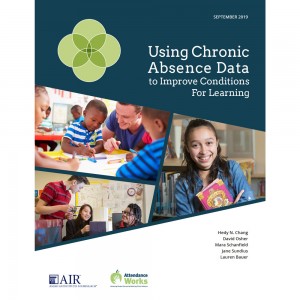 September 2019 brief Using Chronic Absence Data to Improve Conditions for Learning by Attendance Works and American Institutes for Research (AIR)
September 2019 brief Using Chronic Absence Data to Improve Conditions for Learning by Attendance Works and American Institutes for Research (AIR)
September 2018 brief Data Matters: Using Chronic Absence to Accelerate Action for Student Success
September 2017 brief Portraits of Change: Aligning School & Community Resources to Reduce Chronic Absence, : “Betsy Rubiner, a consultant, used her fine editorial skills to transform the original draft into a more compelling narrative.”
The Campaign For Grade-Level Reading: Innovation Briefs between 2014-2016, detailing innovative work done by communities across the country to increase the number of children from low-income families who read well.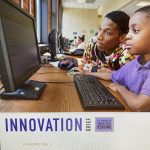
- Engaging Parents in Boosting Children’s Early Language and Brain Development 2014.
- HealthyReaders, 2015
- Self-Assessment, 2015
- Reaching&SupportingParents Where They Are, 2015
- DrivingWithDataInnovationBrief, 2016
The Annie E. Casey Foundation, Strengthening Rural Families Print Series: Practice briefs highlighting programs and organizations across the United States that use rural family economic success strategies. 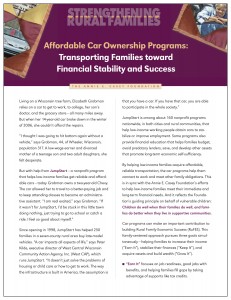
- By the Numbers-Using Data to Drive Action highlights how data collection and analysis can be incorporated into the Casey Foundation’s framework for rural family economic success: Earn It, Keep It, and Grow It. Specifically, this brief portrays how data collection and analysis have underpinned decision-making efforts to improve the well-being of low-income working families in Minnesota.
- Affordable Car Ownership Programs: Transporting Families Toward Financial Stability and Success showcases innovative programs that are helping rural low-income families to acquire affordable, reliable transportation as a strategy to stabilize or improve their employment situation. The need for a car is particularly critical in rural areas, where there usually are no public transportation options, and jobs and fair-priced goods and services are far away. The brief describes a variety of car program approaches and how they help to build family economic success in rural communities.
- Building a community coalition to advance rural family economic success highlights the development of a new community foundation to serve struggling families in three Florida counties. The foundation and its community partners now have launched a family economic success initiative.
- Southern Bancorp and Southern Good Faith Fund: Tailoring Financial Services to Help Families Get Ahead details findings that show that to move ahead financially low-income families need additional supports such as banking services to accumulate assets. This document also recounts the rigor in drawing low-income families into ongoing banking relationships.
- Mortar And Muscle Building Community And AssetsThrough Self-Help Housing looks at the experiences of families working to build their own homes through self-help housing projects across the United States. By combining personal stories, data, and descriptions of promising program models, this document highlights how self-help housing projects are strengthening communities and creating informal, positive social networks.
Grants/Grant Progress Reports:
- Alliance for Children’s Rights (Los Angeles), Grant progress reports 2017.
- EMBARC/Ethnic Minorities of Burma Advocacy & Resource Center (Des Moines), Grants, 2017.
- Reading is Fundamental, Grant Progress Report on RIF’s Read for Success summer literacy program in South Carolina, 2017.
- Iowa Council of Foundations, Grant Progress Report on work by Campaign for Grade-Level Reading efforts across Iowa, 2016.
Additional Publications written:
National Civic Review: 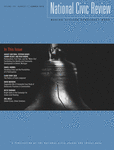 Volume 105 Number 2 Summer 2016 Making Citizen Democracy Work/A National Civic League publication: Bright Spots in the Campaign for Grade-Level Reading
Volume 105 Number 2 Summer 2016 Making Citizen Democracy Work/A National Civic League publication: Bright Spots in the Campaign for Grade-Level Reading
The Aspen Institute Community Strategies Group – wrote RuFES Action Alerts: 2013 Profiles illustrating Rural Family Economic Success programs that help low-income rural families earn it, keep it and grow it, including:
- An affordable home for the holidays With its beaches, forests, farms, and bucolic villages, Orcas Island – a rural island of 5,000 residents off the coast of northwest Washington State – has long drawn honeymooning, whale-watching, kayaking tourists and, increasingly, tech-exec millionaires building luxury homes. But as the “hidden Paradise” reputation of Orcas grew with vacationers and second home-owners, soaring land and home prices increasingly made living on the island challenging for the low- and modest-income full-time residents who originally called Orcas home and kept it running – teachers, health techs, waiters, builders, artists, and small business owners. In short, Orcas developed an affordable housing shortage.
- Saving for a Rural Snowy Day MAINE — In the dog days of summer, it’s hard to think about winter, let alone sky-high home heating costs. But low-income rural families in southwest Maine can’t start saving early enough in their Rainy Day Savings Account – a matched savings account that they can use to save up for emergency expenses like an unaffordable winter heating bill. Costly home heating “is a big issue here,” says Janet Smith, of the Maine Centers for Women, Work & Community (WWC) office in the Franklin County seat of Farmington. “There’s a lot of older housing stock in our rural county that might not be weatherized and we have pretty cold winters. People have a hard time having enough funding to make it through.”
The Campaign For Grade-Level Reading: 68 Bright Spots, between 2013-2016, showcasing the work of 61 communities in 27 states to increase the number of children from low-income families who read well. Samples: (Full list at bottom.)
- Phoenix The Phoenix Public Library and the Arizona Literacy & Learning Center partnered to provide free reading screenings for kindergarten through third-grade students to identify and provide support for struggling readers early on.
- Arkansas The Arkansas Campaign for Grade-Level Reading is working to address summer learning and summer hunger, reduce chronic absence and expand access to quality summer learning programs.
- Oakland Three school years worth of data were used to construct the Oakland Reads Baseline Report, which looks at school readiness, attendance, summer learning and parent engagement to help define Oakland’s challenges and develop strategies to increase the percentage of children reading proficiently by the end of third grade. Two workgroups are using the challenges identified in the 84-page report to create a “theory of action” and a road map with strategies.
- Longmont About 100 Longmont, Colorado families were served in 2014 by two parent education programs that offer school readiness and support — Abriendo Puertas/Opening Doors and Nurturing Parenting. The programs are expanding to serve 130 families.
Aspen Institute, Economic Opportunities Program/Workforce Strategies Initiative, editing projects:
- 2020 Proofed – Thrive Rural Report: Equitable Recovery and Resilience in Rural America
- Reinventing Low-Wage Work: Ideas that Can Work for Employees, Employers and the Economy, editing of four industry/program profiles 2013
- Through the Maze: Helping Adult Learners Navigate Community College and the Labor Market, 2013
- Training Futures: A case study of a non-profit-community college partnership that operates a career preparation program for low-income adults, 2012
- Not Just Apprenticeship: How Construction Pre-Apprenticeship Programs Meet a Range of Industry and Worker Needs, 2012
- Results Driven: Using the Business Value Approach to Design and Assess Workforce Services, 2011
- Where Labor Supply Meets Labor Demand: Connecting Workforce Development to Economic Development in Local Labor Markets, 2011
Ounce of Prevention Fund, 2012, Update of Educare marketing materials
Annie E. Casey Foundation:
2020 Copyediting for Internal Communications
2011 KIDS COUNT Data Book Family Stories: Co-author of five family profiles illustrating the human impact of the recent economic downturn and the benefit of government programs. http://datacenter.kidscount.org/databook/2011/familystories.aspx
Annie E. Casey Foundation, Rural Family Economic Success Web-based Series: Website stories highlighting strategies that help families build economic stability in rural regions and communities, including:
- Diversifying the economy to create jobs and help families prosper in South Dakota: Facing the common rural challenges of outmigration and a dying agricultural-based economy, the residents of Howard, South Dakota and the surrounding county looked to the economic engines of the future to create employment opportunities and increase income. From developing wind energy-related businesses to organic beef production, Miner County has re-energized its citizens, revitalized its economy, and recaptured some former community members.
- Expanding College and Job Skills Opportunities in Western Maine: In Franklin County, Maine, a group of local leaders has brought community college classes and jobs skills training to their area, giving residents new opportunities to qualify for good jobs and higher expectations for their futures. It is also providing employers—and prospective employers—with a new supply of well-educated workers.
- Supporting Families Starts with Preschool in Rural Maryland: With a targeted preschool program, incentives to enter community college, savings accounts for families, and loans for small business owners, Garrett County, Maryland is working to develop a more skilled workforce and raise income levels for county residents.
- Using Local Creativity and Entrepreneurship to Build Family-Supporting Jobs in North Carolina. This story addresses “Earn It” strategies that residents of the Appalachian region of western North Carolina are using to redevelop their economy by building on their age-old tradition of crafts and using it as a springboard to also expand their agricultural and tourism industries. An Asheville nonprofit, Handmade in America, is providing support, inspiration and know-how to help the region build on its strengths.
Community Action Partnership, Facing the New Reality, editing (2011)
Greater Milwaukee Foundation/Community Foundation of Greater South Wood County, Issue Brief: Using Online Tools to Improve Public Benefits: Effective Design and Outreach to Help People Get Work Supports via the Web
Child and Family Policy Center, Des Moines, writer and consultant
Mid-Iowa Health Foundation, 2018 Partner Profiles, 25th Anniversary Annual Report, writer and consultant
The Aspen Institute Community Strategies Group RuFES Community Action Guide and Idea Book, writing , editing, consultation
The Commonwealth Fund, synopses: “In the Literature” summaries of newly- published studies on issues affecting health system performance and quality
Southern Bancorp/Southern Good Faith Fund, book development proposal documenting efforts to transform rural communities in Arkansas and Mississippi, writer
Ready Kids, Making Connections Magazine, published for the Casey Foundation through Drake University, editorial coordinator, contributing writer
Annie E. Casey Foundation newsletter, Casey Connects, and Casey Family Services magazine, Voice, contributing writer, editor and production support
Making Connections – Des Moines, Annie. E. Casey Foundation, site writer
Re-Enter: the Social Cost of Incarceration, Making Connections Magazine, published for the Casey Foundation through Drake University, editorial coordinator, contributing writer
Tuberous Sclerosis Alliance, newsletter, writer
Connect Des Moines, Making Connections Magazine, published by Casey Foundation and Drake University, contributing writer
Counselor, The Alumni Magazine of Drake University Law School, Des Moines, contributing writer
Planned Parenthood of the Heartland newsletter, contributing writer
Iowa Departments of Human Services, Public Health and Education, Creating a System of Mental Health Services for Children in Iowa: A Report from the Children’s Mental Health Initiative.
Governor’s Child Care and Early Education Task Force, Iowa: Report and Recommendations
##
Philosophy & Approach:
My Goal: To explain clients’ grant-making and major initiatives to an outside audience in a clear and compelling way.
Listen and Learn: Clients don’t always know what they want – or agree among themselves about what they want so before I report, write and edit, I often help clients decide what they want to communicate and how. I ask questions and propose options. Close communication and collaboration is essential and ongoing.
Make it Real: Whenever possible, I let other people – especially those living the issue I’m writing about – tell the story, clearly and with dignity. I emphasize the real-world implications and potential of policies and initiatives, whether I’m writing about an asset-building initiative for low-income families in the Mississippi Delta; a grade-level reading campaign in Iowa; or Connecticut’s new response to child abuse and neglect reports.
Make it Sing: I work hard to translate complicated topics and programmatic jargon into engaging stories with accessible language, color, quotes, and anecdotes, for both a Web and print audience.
Get it right: I readily admit what I don’t know and, when need be, press gently for a clearer explanation that a lay reader will understand. Accuracy matters. I routinely work with clients to fact-check stories.
Convince the Reader to Care: I strive to convince people to read, to keep reading, and to care about what they’ve just read.
Innovation Brief written for the Campaign for Grade-Level Reading. Click here for the Strengthening Rural Families Brief (bel0w), written for the Annie E. Casey Foundation.
##
The Campaign For Grade-Level Reading: 68 Bright Spots between 2013-2016 showcasing the work of 61 communities in 27 states to increase the number of children from low-income families who read well. Full List: (Sample list at top.)
- Phoenix, Arizona: The Phoenix Public Library and the Arizona Literacy & Learning Center partnered to provide free reading screenings for kindergarten through third-grade students to identify and provide support for struggling readers early on.
- Arkansas: The Arkansas Campaign for Grade-Level Reading is working to address summer learning and summer hunger, reduce chronic absence and expand access to quality summer learning programs.
- Fresno, California: libraries serve a cold lunch every weekday from mid-June to early August and plan to broaden enrichment activities to include the sciences.
- Los Angeles: Vision To Learn provides elementary school children in the area with free eye exams and glasses, helping those who struggle to see become better readers.
- Oakland: Used three school years worth of data to construct the Oakland Reads Baseline Report, which looks at school readiness, attendance, summer learning and parent engagement to help define Oakland’s challenges and develop strategies to increase the percentage of children reading proficiently by the end of third grade. Two workgroups are using the challenges identified in the 84-page report to create a “theory of action” and a road map with strategies.
- Richmond, California: West County Reads’ Take it, Leave it Bookshelf program puts about 10,000 books per year in locations frequented by low-income families, such as laundromats, barber shops and churches.
- Sacramento: Successfully launched a chronic absence effort that aims to shift the conversation and the school system. Sacramento City Unified School District is now testing new strategies to reduce chronic absence, after gathering data to better understand and illustrate the issue.
- San Francisco: Fifty-thousand children from low-income families in the greater San Francisco Bay Area will benefit from summer reading programs thanks to a philanthropic initiative tied to Super Bowl 50. Learn more about The Re(a)d Zone here.
- Stockton:The area’s Reach Out and Read program reaches around 6,000 children who receive care in 12 public and private medical offices serving low-income families. The program also distributes 11,000 children’s books a year, including books written in Spanish and Asian languages from Khmer to Urdu that accommodate the area’s diverse population.
- Tahoe Truckee: The Neighborhood Summer Reading Program in Tahoe Truckee sponsors teachers’ visits to isolated mobile home parks during the summer to provide literacy activities and reading time.
- Longmont, Colorado: About 100 families were served in 2014 by two parent education programs that offer school readiness and support — Abriendo Puertas/Opening Doors and Nurturing Parenting. The programs are expanding to serve 130 families.
- Bridgeport, Connecticut: Offers Kick Off to Kindergarten, a free summer program designed to introduce literacy, numbers, group play and more to pre-K students in an effort to ensure all children are kindergarten-ready and able to read proficiently by the end of third grade.
- Hartford: Efforts to identify and address barriers to school attendance helped half of the city’s public schools serving elementary students reduce chronic absence in 2014-2015 by at least 5 percent from the previous year.
- New Britain: Between 2012 and 2013, the percentage of chronically absent students plummeted in New Britain’s 10 elementary schools – for kindergartners, from 30 to 18 percent; first graders from 24 to 13 percent; second graders from 19 to 14; and third graders from 15 to 11 percent.
- Vernon, Connecticut: The school district developed a plan to improve attendance at all seven of its schools, serving 3,500 students. The data driven strategies have reduced chronic absence, especially in kindergarten and the elementary grades. Also, their public library is one among the libraries in four Connecticut communities to receive a grant to develop a program combatting summer slide. In 2015, the third summer of the “READy for the Grade” initiative, 150 children ages 5 to 8 participated across all four communities.
- Delray Beach: To assess the extent of summer learning loss, the city’s Grade-Level Reading coalition developed a data sharing agreement between the city and the county school district. Delray Beach also supported development of literacy-rich summer learning programs.
- Sarasota: Third grade reading proficiency at Alta Vista Elementary jumped more than 35 percent in 2014 as a result of collective effort led by the Community Foundation of Sarasota County. The Patterson Foundation, based in Sarasota, is among more than 25 organizations partnering on the community’s grade-level reading campaign, which is focused on addressing school readiness and summer learning loss.
- Tampa: The Summer Care program began as an effort to bolster low-income families’ financial stability. Now, it works to help those families’ children improve their reading proficiency over the summer.
- Vero Beach: Teachers in Indian River County are not only learning new ways to teach reading to students with dyslexia, they are also using the same approach to improve how they teach all students to read. Vero Beach is also promoting Moonshot Moment, an early literacy campaign to have 90 percent of children reading on grade level by the end of third grade in 2018.
- Georgia: The statewide grade-level reading campaign coordinated efforts to provide free meals and literacy activities in local libraries to children in 22 counties.
- Waukegan, Illinois: Partners in this 2014 Pacesetter community developed a full-day summer learning program—available to hundreds of young children—by combining two already available part-day offerings.
- Fort Wayne: Let’s Talk®, an oral language development initiative in Fort Wayne, works to increase the quantity and quality of conversations between young children and their parents or caregivers in order to boost early learning and school readiness.
- Ames, Iowa: Offers free, one-on-one individualized tutoring during the summer to young struggling readers, provided by community volunteers trained by literacy development expert Donald Bear. Reading Buddies reaches about 150 children in kindergarten through fourth grade.
- Council Bluffs, Iowa: Combines school attendance and readiness strategies through teacher home visits to preschoolers.
- Dubuque: Has earned some early GLR successes because its campaign was embedded into a longstanding cradle-to-career initiative, providing some important organizational fundamentals including an informed community engaged in improving children’s prospects; strong leadership within a well-functioning network; and data-gathering prowess.
- Quad Cities, Iowa/Illinois: The free, six-week Summer Enrichment Program in Quad Cities served 295 elementary school-age children from low-income families in 2014, increasing literacy scores by an average of 9.3 percentage points, and their unique data warehouse helps identify and solve issues around early literacy.
- Marshalltown, Iowa: Boosts school readiness and attendance among young children from low-income families, using the Perfectly Punctual Campaign. The community was recognized as a 2014 Pacesetter after its number of school-ready kindergarteners increased from 25 to 32 percent between 2011-12 and 2013-14.
- Topeka: A unique community partnership including the Topeka Housing Authority provides free public school preschool to children from low-income families— in the public housing complex where most live. The first graduates went from scoring as low as the 20th percentile on a pre-K literacy assessment to scoring above the 80th percentile. A summer program was added in 2014.
- Baltimore: Raising a Reader (RAR), in partnership with Baltimore City Public Schools and Head Start programs, will provide books and family reading strategies to more than 11,000 Baltimore-area children. Funding from Target Corporation allowed RAR to expand its nationally successful literacy program to Baltimore.
- Holyoke, Massachusetts: Saw attendance for elementary school students increase after creating attendance teams and offering district- and schoolwide incentives to reduce chronic absence.
- Pittsfield, Massachusetts: Pittsfield Promise, an early childhood literacy initiative linked to the community’s grade-level reading campaign, plans to measure the before-and-after impact of new summer literacy programs in the area and aims to raise the percentage of third graders reading proficiently from 44 percent in 2012 to 90 percent by 2020.
- Springfield, Massachusetts: This community is reaching more than 300 children and their parents through Talk/Read/Succeed!, an early literacy effort that works directly with families living in public housing to address their needs.
- Worcester, Massachusetts: Four public elementary schools that had no or limited library facilities due to long-ago budget issues will each house a children’s services branch of the Worcester Public Library. Two have opened since fall 2013. The other two are slated for spring.
- Kent County, Michigan uses Kent School Services Network, a community school initiative that places providers such as community school coordinators and behavioral health clinicians in the county’s highest-poverty schools to decrease chronic absenteeism and help students and their families succeed. Also in Kent County, thanks to strong support from the faith community, more than 1,200 students in this Grade-Level Reading community will attend a summer learning academy in 2015, more than a third of whom are preschool and early elementary children.
- Gulfport, Mississippi: Undeterred by a lack of government funds and school space, South Mississippi PreK4Ward uses private donations and creative locations to provide free full-day prekindergarten to 132 children across two counties. PreK4Ward serves primarily low-income families, serving families eligible for Head Start or that just miss eligibility.
- Kansas City, Missouri: In 2015, free summer learning programs will be available for nearly 16,000 children in 20 elementary schools and other sites in the Kansas City Public Schools—more than twice the 2014 enrollment.
- Las Vegas: Hopes to expand its pilot program to reduce chronic absence among at-risk students. Begun at one elementary school, the pilot reduced chronic absence among three student populations with a disproportionately high number of chronically-absent students.
- Reno: Signs posted on Born Learning Trails in Reno offer learning activities families can engage in to boost their child’s development while enjoying the outdoors. The trails have also helped to involve community volunteers in boosting early literacy, school readiness and physical activity.
- Camden, New Jersey: Camden’s Grade-Level Reading Campaign, Born to Read, has launched a volunteer-based one-on-one reading program for preschoolers as part of its multi-faceted early literacy initiative.
- Paterson, New Jersey: Paterson’s School No. 5, which serves mostly low-income and ELL students, saw its number of chronically absent students drop by 76 percent last year. The school’s “Success Mentor” program and other strategies developed by GLR partner Attendance Works contributed to the swift progress.
- Buffalo: Offers the Parent-Child Home Program, which provides two years of intensive, twice-weekly home visits to under-resourced families with children between age 16 months and 4 years. Early literacy specialists provide dialogue to promote language development, cognitive skills and social competencies that help children enter school with the skills to be successful.
- Syracuse: Uses Imagination Library to distribute more than 50,000 books since 2010 and serve 3,000 children, many from low-income and refugee families. An evaluation showed families in the program were more likely to read to their children.
- New York City: The Once Upon a Summer program provides opportunities for summer learning and extended learning for children in the area’s poorest neighborhoods.
- Charlotte: A coalition led by The Belk Foundation successfully launched Read Charlotte in February 2015, rebooting the community’s grade-level reading campaign. Read Charlotte is a $5.5 million initiative to double the percentage of Charlotte third graders reading proficiently by 2025.
- Southern Pines, North Carolina: Ratcheted up its literacy work in 2013 by creating a new summer learning project tailored to kindergarten through second-grade students reading below grade level.
- Wake County, North Carolina: The county’s Grade-Level Reading Campaign, WAKE Up and Read, collected almost 70,000 books in a spring book drive to help disadvantaged children build their literacy skills before reaching kindergarten.
- Cincinnati: Identifies and treats mothers with depression through Every Child Succeeds, a home visiting effort to foster more nurturing and stimulating interactions with their children and increase school readiness.
- Dayton: More than 800 high-risk students in two summer programs made significant strides in literacy and reading. The programs, operated by Building Educated Leaders for Life (BELL) and Freedom Schools, were part of a community effort to expand summer learning options led by Learn to Earn Dayton/ReadySetSoar.
- Eugene: Promotes school readiness with a summer program for children entering kindergarten and their parents. Kids in Transition to School focuses on literacy, self-regulation and social skills.
- Wallowa County, Oregon: Home to a partnership between two local nonprofits—a rural health center and a family support organization – that work together at the health center to promote healthy development, early literacy and school readiness for young children.
- Berks County, Pennsylvania: Hundreds of parents receive short videos modeling fun and easy literacy and math activities for young children through ReadyRosie, an online parent engagement tool.
- Providence: Schools enlist City Year volunteers to work one-on-one with students who have a history of chronic absence to set goals and make a plan to boost their attendance.
- Richland County, South Carolina: The Richland Library hosts a number of events during the summer months and throughout the school year that support early learning, family literacy and, ultimately, grade-level reading and success in school and beyond.
- Austin: Worked to collect data to determine demand for summer learning programs, and leadership groups are now discussing better ways to align their work and make these programs accessible to all children in the area, regardless of family income.
- Houston: Five hundred students in 15 Houston-area elementary schools participate in a peer-to-peer reading tutoring program that matches trained fourth- and fifth-grade tutors with second- and third-grade tutees. The program is supported by United Way of Greater Houston, a member of the local grade-level reading coalition.
- Palacios, Texas: This small rural community where most children are in poverty and nearly a third have English language barriers, has taken a community approach to addressing local challenges. The Palacios Community Hub, a community learning center, supports national programs like First Book and Reach Out and Read that engage children and parents in early literacy activities.
- San Antonio: Serves 187 4-year-olds in a Dual Language Head Start program that uses a “two-way” model, with each class half Spanish-speakers learning English and half English-speakers learning Spanish. Instruction is 90 percent in Spanish, 10 percent in English, and enables both groups to pick up each other’s language and culture.
- Richmond, Virginia: Is among communities across the country benefiting from Dollar General Youth Literacy Grants made to schools, libraries and nonprofits to help young struggling readers. An elementary school used a $3,000 grant to create a “leveled” library of books meeting varying ability levels and used with small groups of students who need extra help.
- Roanoke: Engages both schools and libraries in a data-driven approach to boost third grade reading proficiency using the Results Scorecard.
- Bellevue, Washington: A free summer learning program has doubled to serve about 1,000 young struggling readers thanks to a broad cradle-to-career community initiative that successfully marries the StriveTogether collective impact approach with Grade-Level Reading Campaign content. Bellevue’s partners include the school district, city and more than 45 community groups.
- Seattle: Works to engage families in summer reading efforts through the area’s “Let’s Read!” campaign. Let’s Read! convenes community planning meetings to strategize ways to support low-income children and families during the summer, distributes books to children and libraries in the region and supports K-2nd grade students in 52 “high-need” elementary schools in seven local school districts.
- Tacoma: Is among many communities nationwide celebrating Read Across America Day on March 2, sponsored by the National Education Association. Tacoma’s community celebration — including 16 events in schools and libraries, some scheduled the Saturday before March 2 — will reach about 2,000 children, over twice as many as last year.
